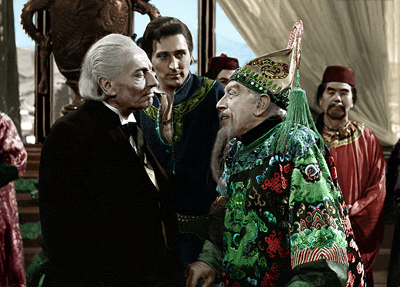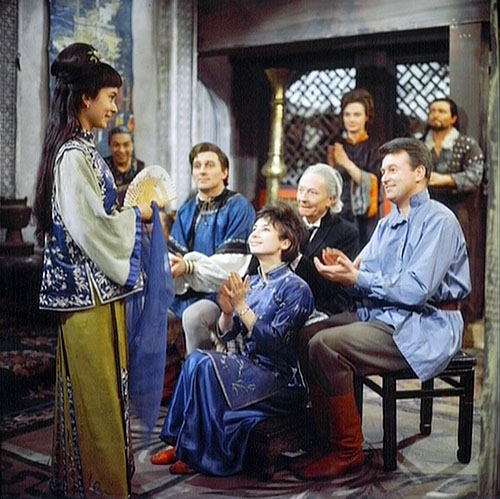
STORY 004: MARCO POLO
The seven-part story Marco Polo is now lost and one of only three stories not known to have any surviving footage. This review is based on the 30-minute condensed version released as a special feature on the DVD release of The Daleks & The Edge of Destruction (Inside the Spaceship).
Marco My Words...
It might be ironic if it weren't so sad. The seven-part Marco Polo, one of the most popular stories of early Doctor Who, is now along with The Massacre and the one-off Mission to the Unknown, one of only three stories of which there is no footage known to exist. Nothing exists from this story in terms of film. We do have photographs and the soundtrack, yet these were not because of the BBC archives.
It might be ironic if it weren't so sad. The seven-part Marco Polo, one of the most popular stories of early Doctor Who, is now along with The Massacre and the one-off Mission to the Unknown, one of only three stories of which there is no footage known to exist. Nothing exists from this story in terms of film. We do have photographs and the soundtrack, yet these were not because of the BBC archives.
Instead, a curious thing began to happen as the show progressed. Fans became so devoted to the series that they began to record it onto audio cassettes so that they could listen to it whenever they wanted. If it weren't for these fans, there would be nothing on which to build a reconstruction of any kind. There would have been no audio or visual record of note for not only Marco Polo, but for other lost stories, especially for the Troughton era. Yet again, I'm getting ahead of myself.
Though in theory it is possible that actual film footage may still exist somewhere, it is highly unlikely that it does. What we have in regards to Marco Polo is a "Best-Of" highlight reel, if you will. As it stands, the story, the first truly historic story, offers us an interesting glimpse of what it was and what could have been.
In the course of seven stories (The Roof of the World, The Singing Sands, Five Hundred Eyes, The Wall of Lies, Rider from Shang-Tu, Mighty Kublai Khan, and Assassin at Peking), the TARDIS crew encounter the legendary explorer Marco Polo (Mark Eden) and the monarch he serves: The Kublai Khan (Martin Miller). We start with the crew discovering what appears to be a large footprint in the snow. This is discovered to be a normal footprint made larger by the melting of the snow. The TARDIS is in need of repairs, but before anything can be done they are discovered by Mongol warriors. The crew would have been killed if not for the intervention of their leader: the Italian Marco Polo.
Convinced that the crew are human and not demons he agrees to take them to Court. Traveling with him is the Lady Ping-Cho (Zeinia Merton) a young woman promised in marriage to an elderly man at Court and the Warlord Tegana (Derren Nesbitt), an emissary from a rival tribe that is going to Kublai Khan to work out a treaty...or so he says.
Convinced that the crew are human and not demons he agrees to take them to Court. Traveling with him is the Lady Ping-Cho (Zeinia Merton) a young woman promised in marriage to an elderly man at Court and the Warlord Tegana (Derren Nesbitt), an emissary from a rival tribe that is going to Kublai Khan to work out a treaty...or so he says.
Polo sees the TARDIS as the perfect gift for the Khan, a gift so great that the Khan will allow Polo to leave Court and return to Venice. The Doctor is incensed at this duplicity, but he's in no position to argue. As they journey to Cathay (what we now call China), the Doctor makes the repairs while they endure bandits and a lack of water, all while mostly unaware of Tegana's machinations. Ping-Cho and Susan become friends, and once they arrive at Court the elderly Khan is delighted with the TARDIS and with The Doctor, with whom he finds a kinship in their advanced years. Eventually, Tegana is discovered and after attempting to assassinate the Khan, he kills himself. In the ensuing confusion Polo gives The Doctor the TARDIS key, allowing them to escape. In spite of the loss of the TARDIS, the Khan gives Polo leave to return to his own beloved Venice.
For what remains of this still-lost story as of this writing, Marco Polo still holds up rather well. We do have to use a great deal of imagination in regards to what the acting was actually like but based on the audio track both Eden as Polo and Merton as Ping-Cho were excellent. Eden brings a mixture of nobility and desperation to Polo, someone who will stand for those in his care but will also tolerate little disobedience. He also expresses a genuine desire to return to his homeland, and throughout Marco Polo it's this yearning for Venice that motives him. He isn't cruel to torture the crew or Ping-Cho. He merely does what needs to be done to get him to Court and then home.
Merton, who is of mixed British and Burmese ancestry, is brilliant as Ping-Cho. She projects the kindness and sweetness of a naive girl, but also the fear in being taken from her home to marry a man old enough to be her grandfather. It isn't a stereotypical portrayal of an Asian character with an outrageous accent, but a subtle, strong performance of an ordinary girl thrust into a bizarre situation.
It was a good decision on part of writer John Lucarotti to include a sixteen-year-old with whom Susan (Carole Anne Ford) could build a friendship with. Throughout the first three stories there was basically no one with whom Susan could have conversations with. Barbara (Jacqueline Hill), while eventually becoming a friend, was also a bit of a mother-figure, or at very best an older sister. With Ping-Cho, Susan could now have a true mate. Even in the reconstruction, the parting of Susan and Ping-Cho is quite poignant. Through the course of the story, you could see their relationship develop to that of true kinship.
Oddly, it serves as a counterbalance to that between The Khan and The Doctor. While the latter find their old age a building block to their association, the former find unity in their youth. The plus for Ping-Cho and Susan is that they had seven episodes to build their friendship, while The Khan and Doctor had only two.
It was a good decision on part of writer John Lucarotti to include a sixteen-year-old with whom Susan (Carole Anne Ford) could build a friendship with. Throughout the first three stories there was basically no one with whom Susan could have conversations with. Barbara (Jacqueline Hill), while eventually becoming a friend, was also a bit of a mother-figure, or at very best an older sister. With Ping-Cho, Susan could now have a true mate. Even in the reconstruction, the parting of Susan and Ping-Cho is quite poignant. Through the course of the story, you could see their relationship develop to that of true kinship.
Oddly, it serves as a counterbalance to that between The Khan and The Doctor. While the latter find their old age a building block to their association, the former find unity in their youth. The plus for Ping-Cho and Susan is that they had seven episodes to build their friendship, while The Khan and Doctor had only two.
If anyone would be faulted for being slightly over-the-top, it would be Nesbitt's Tegana. However, given the fact that he is suppose to be a villain (and that we can't see HOW he actually acted) one can be forgiving. Not so much for Martin Miller's Khan: he did appear to veer close to the traditional interpretation of Asian characters with the "Ah, so"speech pattern. As it stood, he was only in the final two stories, and here is where I would find fault.
It may be that I am not a fan of long stories. I'm from the "four episodes is good" school of Who stories, so a seven-parter (or longer) tend to wear me down. Even though Marco Polo as it stands now was only 30 minutes long, I get the sense that the journey from the Himalayas to Peking (or Beijing) took WAY too long.
I would have preferred that Tegana's plots be cut down so that we could spend more time at Court. There was an opportunity in Episode Five (Rider from Shang-Tu) to have ended the story, but it would have occurred without the crew actually getting a chance to meet Kublai Khan. I realize the story called for seven episodes, but still, I keep wondering whether the overall story could have been cut or revised to allow more interaction at Court than on the way to Court.
The story should it ever be found, be an interesting sight: back when Doctor Who was thought of as being on the slightly educational bent, this would have served as a history lesson on ancient China. In due course this idea faded to more science-fiction stories, but a little history now and then never hurt anyone.
I would have preferred that Tegana's plots be cut down so that we could spend more time at Court. There was an opportunity in Episode Five (Rider from Shang-Tu) to have ended the story, but it would have occurred without the crew actually getting a chance to meet Kublai Khan. I realize the story called for seven episodes, but still, I keep wondering whether the overall story could have been cut or revised to allow more interaction at Court than on the way to Court.
The story should it ever be found, be an interesting sight: back when Doctor Who was thought of as being on the slightly educational bent, this would have served as a history lesson on ancient China. In due course this idea faded to more science-fiction stories, but a little history now and then never hurt anyone.
As it stands, Marco Polo, the first lost story of Doctor Who, is still, even in its truncated edition, a first-rate story. It would be wonderful to have a full restoration, though I wouldn't think an animated version would work. We should be joyful that we have WHAT we have. It only shows we, like the title character, may yet discover a long-lost world.
Next Story: The Keys of Marinus
7/10


No comments:
Post a Comment
Views are always welcome, but I would ask that no vulgarity be used. Any posts that contain foul language or are bigoted in any way will not be posted.
Thank you.